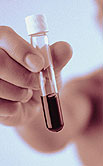- The Best Time of Day to Drink Bone Broth to Maximize Health Benefits
- 8 Ways to Increase Dopamine Naturally
- 7 Best Breads for Maintaining Stable Blood Sugar
- Gelatin vs. Collagen: Which is Best for Skin, Nails, and Joints?
- The Long-Term Effects of Daily Turmeric Supplements on Liver Health
- Could Your Grocery Store Meat Be Causing Recurring UTIs?
- Are You Making This Expensive Thermostat Error This Winter?
- Recognizing the Signs of Hypothyroidism
- 10 Strategies to Overcome Insomnia
- Could Artificial Sweeteners Be Aging the Brain Faster?
Blood Test Shows Promise for Gauging Heart Attack Risk After Chest Pain


Though more study needs to be done, new research suggests that a simple blood test could help predict the heart attack risk of patients experiencing chest pain.
The Swedish study found that patients with chest pain who have undetectable levels of a certain chemical signal in their blood called “high-sensitivity cardiac troponin T,” plus no sign of reduced blood flow, are at very low risk for heart attack over the next month.
The authors of the study, which is to be presented Sunday in Washington, D.C., at the annual meeting of the American College of Cardiology, believe the test could help prevent many unnecessary hospital admissions.
“Chest pain is a potentially life-threatening symptom, as well as being a very common one,” study lead author Dr. Nadia Bandstein, from the Karolinska Institute in Solna, Sweden, said in a meeting news release. “In our hospital it’s the second most common symptom reported in the emergency department. Since there are no established ways to quickly rule out heart attack, many patients are admitted to the hospital unnecessarily, at a large cost to the patient and to society.”
According to Bandstein, “using this blood test along with an ECG [electrocardiogram], we will save about 500 to 1,000 admissions per year in our hospital alone, allowing us to use the beds for sicker patients.”
Still, more research is required. And experts note that studies presented at medical meetings are typically considered preliminary until published in a peer-reviewed journal.
As the researchers explained, high-sensitivity cardiac troponin T is a chemical signal in the blood that can help doctors detect heart damage. It is a relatively new factor used to diagnose heart attack and can be detected in the blood several hours before older methods of measuring troponins.
In conducting the study, Bandstein’s team analyzed blood levels of this chemical signal in almost 15,000 patients who visited emergency rooms in Sweden from 2010 to 2012. They focused on more than 8,900 patients with undetectable levels of troponin who also had no signs of heart damage from reduced blood flow. These patients averaged 47 years of age.
The researchers then examined how many of these patients went on to suffer a heart attack within 30 days. During that time, only 39 of the patients included in the study had a heart attack, the researchers reported. Of these, 15 had no signs of damage due to reduced blood flow.
Overall, only one in every 594 patients who go to the emergency room for chest pain with no sign of heart damage and undetectable levels of troponin are at immediate risk for heart attack, the researchers calculated.
The study found a 99.8 percent probability that this subset of patients was not at risk for heart attack and a 100 percent probability that it wasn’t at risk for death. This was true even after other risk factors for heart disease and how long the patients experienced symptoms were considered.
“Despite our observations before the study, we were still surprised by the strength of our findings,” Bandstein noted.
Current guidelines recommend that high-sensitivity cardiac troponin T be tested at least three hours after chest pain begins. This usually means patients must be admitted to the hospital. The study’s authors said their findings suggest that only one testing would be needed, which could prevent some unnecessary hospital admissions.
Two U.S. heart experts said the study gives support to the validity of the blood test.
“This study provides increasing evidence for the selective use of high-sensitivity cardiac troponin T to help evaluate patients with chest pain for evidence of possible heart attack,” said Dr. Robert Glatter, an emergency medicine physician at Lenox Hill Hospital in New York City.
He did have two caveats, however: First, that more study is needed to validate the accuracy of the test. And second, that a small minority of patients did go on to suffer a heart attack in the month after a good test result.
“This is important to know because having a single normal or negative troponin [test result] initially does not completely remove all risk of suffering a heart attack after discharge from the emergency department,” Glatter said.
While the results are promising, ruling out heart attack or angina (heart-linked chest pain) in high-risk patients with a prior history of diabetes, heart disease, or prior cardiovascular care “may be problematic based on one blood sample alone,” he added. “The entire picture of the nature of the chest pain as well as other presenting symptoms must be taken into consideration.”
Dr. Sripal Bangalore is director of research in the Cardiac Catheterization Laboratory at NYU School of Medicine in New York City. He said the study is “compelling, given the large number of patients included, and shows that a simple blood test combined with the ECG can potentially avoid thousands of hospital admissions every day for patients presenting with chest pain.”
But, Bangalore added that “one should be very careful, however, not to conclude that the opposite is true, [that is,] if you have elevated high-sensitive troponin you are having a heart attack, as there is data to suggest that it is elevated after running a marathon,” for example.
More information
The U.S. National Heart, Lung, and Blood Institute provides more information on heart attack risk factors.
Source: HealthDay
Copyright © 2026 HealthDay. All rights reserved.










